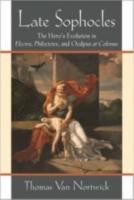
Michigan (2015) h/b 160pp £56.95 (ISBN 9780472119561)
Written in Sophocles’ ninth decade (V.N. places Electra close to 410 BC), Electra, Philoctetes and Oedipus at Colonus are far from being the mellow reflections of old age. Instead, they are contentious and innovative, redefining the rules of Greek tragedy, reimagining the role of the tragic hero and even re-evaluating the place of drama within Athenian society.
This short, clear and elegantly-written study considers how ‘the Sophoclean tragic hero—lonely, defiant, and self-destructive—undergoes a crucial transformation in the last three plays’. Assuming little technical knowledge, V.N. devotes a chapter to each play, outlining how the tragedy unfolds, developing cogent arguments illustrated with quotations in his own English translations (where appropriate including the original Greek, transliterated and in parentheses), and always taking care to set the drama firmly within the context of late-5th C BC society and beliefs.
Thus he argues that the tension between action (ergon) and argument (logos), a polarity beloved of the sophists, permeates the plays, embodied on the one hand by their stubborn yet curiously impotent protagonists, and on the other by deceitful characters such as Orestes, Odysseus and Creon. At the same time, each play includes an element of metatheatre: in Electra the Paedagogus and Orestes utilise the urn and Clytemnestra’s covered corpse as props to help play out the false drama of Orestes’ death; in Philoctetes, Neoptolemus and Odysseus’ false messenger urgently improvise their fraudulent account of the Greek generals’ decision to steal the hero’s bow; and in OC the dramatically unexpected scene between Oedipus and Polyneices becomes a ‘tragedy in miniature’ in which Sophocles portrays ‘his central character banishing entirely a vision of the world and the hero’s place in it that has informed tragedy on the Athenian stage’.
Other themes, too, are explored, including Sophocles’ experiments with the role of the chorus even in these late works and the use of the performing space, but central is the way in which Sophocles draws on, but ultimately rejects, earlier characterisations to transform expectations of what constitutes a tragic hero. In the final chapter, V.N. sketches the historical background to these plays of ‘abused women, wounded soldiers, old men cast out of their homes’, convincingly bringing together the arguments which permeate the preceding chapters.
Aimed primarily at older school students, undergraduates, and their teachers as well as at drama practitioners, the book is well written, cogently argued and compelling, a valuable addition to any library.
David Stuttard
